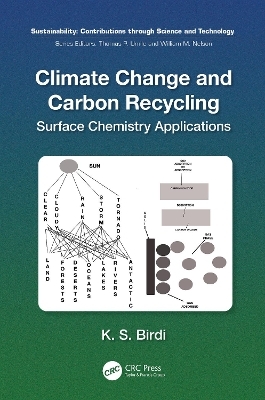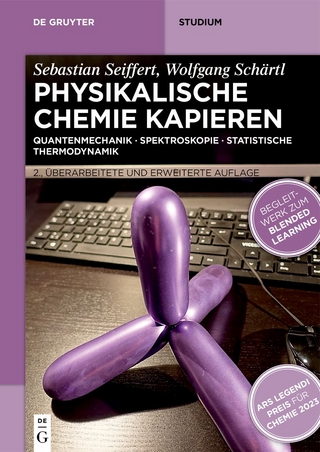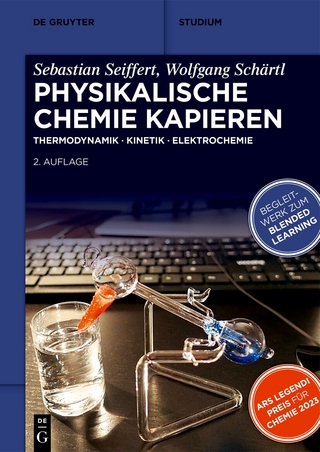
Climate Change and Carbon Recycling
CRC Press (Verlag)
978-1-032-29154-3 (ISBN)
Climate Change and Carbon Recycling: Surface Chemistry Applications describes the application of surface chemistry methods for carbon capture and recycling in relation to climate change and atmospheric CO2 levels. The text is suitable for online education, with both basic and educational descriptions of the climate change process and carbon recycling methods like the adsorption and absorption of CO2 on solids. This book leads to a better understanding of a complex phenomenon and highlight the importance of CO2 capture and sequestration for the future to enable the utilization of fossil fuels without contributing to atmospheric greenhouse gases.
Features
This unique volume specifically highlights the surface chemistry aspects of carbon capture and recycling (CCR)
Fills the need for an online textbook edition, which provides a basic and educational description of the climate change process and carbon capture/recycling
Describes the application of surface chemistry methods for carbon capture and recycling, such as adsorption/absorption of CO2
Discusses the importance of recycling in reducing and controlling the concentration of carbon dioxide in the air (420 ppm: 0.042%)
Describes the importance of the technology related to carbon capture/recycling and sequestration (CCS) from fossil fuel energy plants as a means of CO2 control
Dr. K.S. Birdi studied at ( B.Sc. (Hons)) Delhi University, Delhi, India, and in 1952, he then traveled to the U.S. for further studies, majoring in chemistry at the University of California at Berkeley. After graduation in 1957, he joined Standard Oil of California, Richmond. Dr. Birdi moved to Copenhagen in 1959, where he joined Lever Bros., as Chief-Chemist, Development Laboratory. During this period he became interested in surface chemistry and joined, as assistant professor, the Institute of Physical Chemistry (founder of institute: Professor J. Broensted), Danish Technical University, Lyngby, Denmark, in 1966. He initially did research on surface science aspects (e.g. detergents; micelle formation; adsorption; biophysics). During the early exploration and discovery stages of oil and gas in the North Sea, he got involved in Research Science Foundation programs, with other Research Institutes around Copenhagen, in the oil recovery phenomena and surface science. Later, research grants on the same subject were awarded from the European Union projects. These projects also involved extensive visits to other universities and an exchange of guests from all over the world. Dr. Birdi was appointed Research Professor in 1985 (Nordic Science Foundation), and was then appointed, in 1990 ( retired in 1999), to the School of Pharmacy, Copenhagen, as professor in Physical Chemistry. There was continuous involvement with various industrial contract research programs through- out these years. These projects have actually been a very important source of information in keeping up with real world problems, and helped in the guidance of research planning at all levels.
CHAPTER 1 CARBON RECYCLING/SURFACE CHEMISTRY ASPECTS
1.1 Introduction
1.2 Green-House-Gas (Ghg) & Climate Change (Surface Temperature)
1.3 Composition Of Gases In Atmosphere (Air)
1.4 Fossil Fuels Combustion Phenomena
1.5 Carbon Combustion: Crude Oil & Gas Reserves (Refinery)
1.6 Photosynthesis & Carbon Dioxide Cycle
1.7 Mass Balance Analyses Of Carbon Dioxide (Co2)
1.8 Climate Change Due To Manmade Fossil Fuel Combustion Pollution
1.9 Carbon Capture Recycling & Storage (Ccrs)
1.10 Mechanism Adsoption At Gas/Solid
CHAPTER 2 CARBON GAS CAPTURE METHODS ( ADSORPTION/ABSORPTION )
2.1 Introduction
2.2 Adsorption Of Gas On Solids
2.3 Gas - Liquid (Solution) Absorption Essential
CHAPTER 3 ESSENTIAL SURFACE CHEMISTRY ASPECTS FOR CLIMATE PHENOMENA
SURFACE TENSION OF SUBSTANCES ( LIQUIDS & SOLIDS)
(CLIMATE CHANGE ASPECTS)
3.1 Introduction
3.2 Surface Tension Of Liquids
3. 3 Heat Of Surface Formation And Heat Of Evaporation Of Liquids
3. 4 Surface Tension Of Liquid Mixtures
3.5 Solubility Of Organic Liquids In Water And Water In Organic Liquids
3.6. The Hydrophobic Effect
3.7. Interfacial Tension Of Liquids (Liquid1—Liquid2, Oil—Water)
3.8 Liquid - Liquid Systems: Work Of Adhesion
3.9 Interfacial Tension Theories Of Liquid—Liquid Systems
3.10. Analysis Of The Magnitude Of The Dispersion Forces In Water (Gd)
3.11. Liquid—Solid Systems (Contact Angle—Wetting—Adhesion) Under Dynamic Conditions
3.12. Liquid—Solid Systems (Contact Angle—Wetting—Adhesion) Under Dynamic Conditions
CHAPTER 4 CARBON CAPTURE & RECYCLING & STORAGE (CCRS)—BASICS
4.1 Introduction
4.2. Carbon Dioxide Aqueous Solubility Equilibria
4.3. Fossil Fuel Combustion Process
4.4. Carbon Capture Recycling & Storage (Ccrs) Methods
4.5. Additional Different Carbon Capture Methods
4.6 Storage Of Co2gas In Geological Rock Formations
4.7 Economical Aspects Of Ccra Technology Application
A P P E N D I C E S
APPENDIX A CLIMATE CHANGE-BASIC CONCEPTION-CCRS
A.1 Introduction (Basics)
A.2 Mass Balance Of Heat Radiation
A.3 Earth Global Temperature Balance
A.4 Photosynthesis- Evolutionary Process
A.5 Carbon Dioxide (Co2) Cycle In Oceans/Lakes/Rivers (Estimated)
A.6 Sources Of Carbon Dioxide (Co2gas) Gas
A.7 Role Of Chemical Evolutionary Equilibrium (Cee) And Living Species
A.8 Cost (Estimated) Of Co2 Capture & Recycling Aspects
APPENDIX B
B. Carbon Capture: Procedures: Surface Chemistry Aspects
B.1 Introduction
B.2. Atmosphere- Interface (Water)
B.3. Adsorption Of Carbon On Solid Surfaces
B.4. Solid Materials Used
| Erscheinungsdatum | 21.12.2023 |
|---|---|
| Reihe/Serie | Sustainability: Contributions through Science and Technology |
| Zusatzinfo | 2 Tables, black and white; 2 Line drawings, color; 64 Line drawings, black and white; 2 Illustrations, color; 64 Illustrations, black and white |
| Verlagsort | London |
| Sprache | englisch |
| Maße | 156 x 234 mm |
| Gewicht | 603 g |
| Themenwelt | Naturwissenschaften ► Biologie |
| Naturwissenschaften ► Chemie ► Physikalische Chemie | |
| Technik ► Elektrotechnik / Energietechnik | |
| Technik ► Umwelttechnik / Biotechnologie | |
| ISBN-10 | 1-032-29154-0 / 1032291540 |
| ISBN-13 | 978-1-032-29154-3 / 9781032291543 |
| Zustand | Neuware |
| Informationen gemäß Produktsicherheitsverordnung (GPSR) | |
| Haben Sie eine Frage zum Produkt? |
aus dem Bereich


